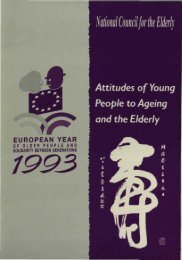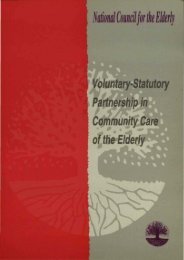From Ageism to Age Equality: Addressing the Challenges ...
From Ageism to Age Equality: Addressing the Challenges ...
From Ageism to Age Equality: Addressing the Challenges ...
You also want an ePaper? Increase the reach of your titles
YUMPU automatically turns print PDFs into web optimized ePapers that Google loves.
Article 6, which provides governments with <strong>the</strong> facility <strong>to</strong> exempt certain actions by employersand governments from being defined as illegal even if <strong>the</strong>y are clearly discrimina<strong>to</strong>ry. This is <strong>the</strong>most important part of <strong>the</strong> Directive for determining <strong>the</strong> levels of protection from agediscrimination from which workers can benefit. The Directive suggests criteria whichgovernments may focus on when defining an exemption: if <strong>the</strong>re are, for example, ‘legitimateemployment policy, labour market or training requirements’. Employers who want <strong>to</strong> useexemptions, however, must be able <strong>to</strong> justify <strong>the</strong>m as reasonable and necessary. This is ademanding test and one that will be explored in many employment tribunals. The debate over<strong>the</strong> implementation of this Article has been protracted in many States and I anticipate that <strong>the</strong>legal cases testing <strong>the</strong> transpositions will be even more protracted.Beyond <strong>the</strong> legal details of <strong>the</strong> Directive, <strong>the</strong>re are also important requirements placed ongovernments <strong>to</strong> consult stakeholders, including non-governmental organisations (NGOs), and raiseawareness among people and organisations with rights and responsibilities under <strong>the</strong> law. Unlike <strong>the</strong>race and gender legislation, however, <strong>the</strong> Framework Employment Directive does not requiregovernments <strong>to</strong> set up a body such as The <strong>Equality</strong> Authority <strong>to</strong> promote awareness and adviseindividuals.There has been much concern expressed by age sec<strong>to</strong>r organisations, including AGE, about <strong>the</strong>Framework Employment Directive. When <strong>the</strong> original negotiations were taking place, age sec<strong>to</strong>rNGOs were dissatisfied that <strong>the</strong> legislation was <strong>to</strong> be restricted <strong>to</strong> employment and training when itis known that older people also face discrimination in o<strong>the</strong>r areas including healthcare, housing andfinancial services. We were also concerned that <strong>the</strong> drafting of Article 6 in particular would provideloopholes that would blunt <strong>the</strong> effectiveness of <strong>the</strong> Directive; we worked hard <strong>to</strong> eliminate <strong>the</strong>se asfar as we could. This being said, we are also clear that, if effectively implemented, <strong>the</strong> FrameworkEmployment Directive offers <strong>the</strong> following significant gains for older people:59it offers an opportunity <strong>to</strong> promote awareness of age discrimination, a form of discriminationwhich is barely recognised in Europe but which was first banned in Canada in 1964 and in <strong>the</strong>USA in 1967it positions age alongside o<strong>the</strong>r forms of discrimination and presents an opportunity <strong>to</strong> develop abroader, more positive approach <strong>to</strong> equality and diversity which recognises <strong>the</strong> complexities ofidentity experienced by most peopleit provides a platform <strong>to</strong> raise wider issues including those linked <strong>to</strong> goods and services, housingand images of older peopleit begins <strong>to</strong> deal with <strong>the</strong> under-employment of older people, a key issue within Europeaneconomyit bans age discrimination in job advertisements and recruitment, training and development,retirement, pay and promotion.Response of National GovernmentsCritical <strong>to</strong> achieving <strong>the</strong> changes which underpin <strong>the</strong> Directive is <strong>the</strong> response of nationalgovernments. There are three elements <strong>to</strong> this (what we at AGE call <strong>the</strong> ‘Triangle of Activity’) whichneed <strong>to</strong> be coordinated and integrated: legislation; culture change; and support services. Firstly,having agreed <strong>to</strong> <strong>the</strong> legislation, it is our view that governments must transpose and enact <strong>the</strong>Directive effectively. Secondly, age discrimination is ingrained within European culture. It is <strong>the</strong>refore<strong>From</strong> <strong><strong>Age</strong>ism</strong> <strong>to</strong> <strong>Age</strong> <strong>Equality</strong>: <strong>Addressing</strong> <strong>the</strong> <strong>Challenges</strong>















